Understanding the Significance of International Women’s Day
International Women’s Day (IWD) is celebrated annually on March 8th, serving as a global reminder of the social, economic, cultural, and political achievements of women around the world. This day not only commemorates the progress made towards gender equality but also highlights the ongoing struggles and challenges faced by women worldwide. The origins of International Women’s Day can be traced back to the early 20th century, marked by women’s movements and activism for equal rights and better working conditions. Today, it has evolved into a day of celebration, reflection, and advocacy for gender parity.
Origins of International Women’s Day:
The roots of International Women’s Day can be traced back to the labor and socialist movements of the early 20th century. The first National Women’s Day was observed in the United States on February 28, 1909, in honor of a garment workers’ strike in New York City. The following year, the Socialist International, meeting in Copenhagen, established International Women’s Day to advocate for women’s rights, including suffrage and better working conditions.
The day gained momentum globally, with events and demonstrations spreading across countries in Europe, North America, and beyond. In 1917, Russian women took to the streets on March 8th (February 23rd in the Julian calendar then used in Russia) to protest against food shortages, inequality, and the monarchy, marking the beginning of the Russian Revolution. This pivotal moment further solidified March 8th as the official date for International Women’s Day.
The Meaning of International Women’s Day:
International Women’s Day is more than just a date on the calendar; it represents a collective effort to recognize and celebrate the contributions of women to society. It serves as a platform to raise awareness about gender inequality, advocate for women’s rights, and promote gender inclusivity in all aspects of life. The day also honors the achievements of women in various fields, including politics, science, arts, business, and social activism.
Moreover, International Women’s Day highlights the ongoing struggles that women face worldwide, including discrimination, violence, limited access to education and healthcare, unequal pay, and underrepresentation in leadership positions. By acknowledging these challenges, the day serves as a catalyst for change, inspiring individuals and organizations to take action towards achieving gender equality.
Reminders on International Women’s Day:
On International Women’s Day, it is essential to reflect on the progress made towards gender equality while acknowledging the work that still needs to be done. Here are some key reminders for individuals and communities on this special day:
- Recognize Intersectionality: Intersectionality acknowledges that women’s experiences are shaped by multiple intersecting factors, including race, ethnicity, class, sexuality, disability, and more. It is crucial to recognize and address the unique challenges faced by women from marginalized communities and ensure that feminist movements are inclusive and intersectional.
- Amplify Women’s Voices: Use International Women’s Day as an opportunity to amplify the voices of women, especially those whose voices are often marginalized or silenced. Support women’s participation in decision-making processes, elevate their achievements, and create platforms for them to share their stories and perspectives.
- Promote Gender Equality: Advocate for policies and practices that promote gender equality in all aspects of life, including education, employment, healthcare, politics, and the media. Support initiatives that aim to close the gender pay gap, combat gender-based violence, and dismantle systemic barriers to women’s advancement.
- Challenge Stereotypes and Bias: Challenge gender stereotypes and biases in your personal and professional life. Encourage critical thinking and dialogue around harmful stereotypes and promote positive representations of women in the media, literature, and popular culture.
- Support Women-Owned Businesses: Show your support for women entrepreneurs and women-owned businesses by purchasing their products and services. Investing in women’s economic empowerment not only contributes to their financial independence but also strengthens communities and economies.
- Educate and Empower: Educate yourself and others about the issues affecting women and girls globally. Take action to educate young people about consent, healthy relationships, and gender equality. Empower women and girls to pursue their dreams and aspirations without limitations or barriers.
- Take Action Year-Round: While International Women’s Day serves as a focal point for advocacy and awareness, the fight for gender equality is ongoing and requires sustained effort. Commit to taking action year-round to create a more inclusive and equitable world for future generations.
Making International Women’s Day Meaningful:
There are many ways to make International Women’s Day meaningful, both for the present and the future:
- Organize or Attend Events: Participate in local events, rallies, workshops, or panel discussions focused on women’s rights and gender equality.
- Engage in Advocacy: Write to policymakers, support women’s rights organizations, and advocate for legislative changes that promote gender equality.
- Donate to Causes: Contribute to organizations working to empower women and girls, provide access to education and healthcare, and combat gender-based violence.
- Celebrate Women’s Achievements: Recognize and celebrate the achievements of women in your community or workplace through awards, ceremonies, or social media campaigns.
- Educate Others: Use International Women’s Day as an opportunity to educate others about the importance of gender equality and the ongoing struggles faced by women worldwide.
- Promote Diversity and Inclusion: Create inclusive spaces where all women feel valued, respected, and empowered to thrive. Support initiatives that promote diversity and inclusion in the workplace, schools, and communities.
In conclusion, International Women’s Day is a time to celebrate the progress made towards gender equality, honor the achievements of women, and renew our commitment to advancing women’s rights worldwide. By taking meaningful action and fostering a culture of inclusivity and empowerment, we can create a more equitable and just society for everyone, now and in the future.

